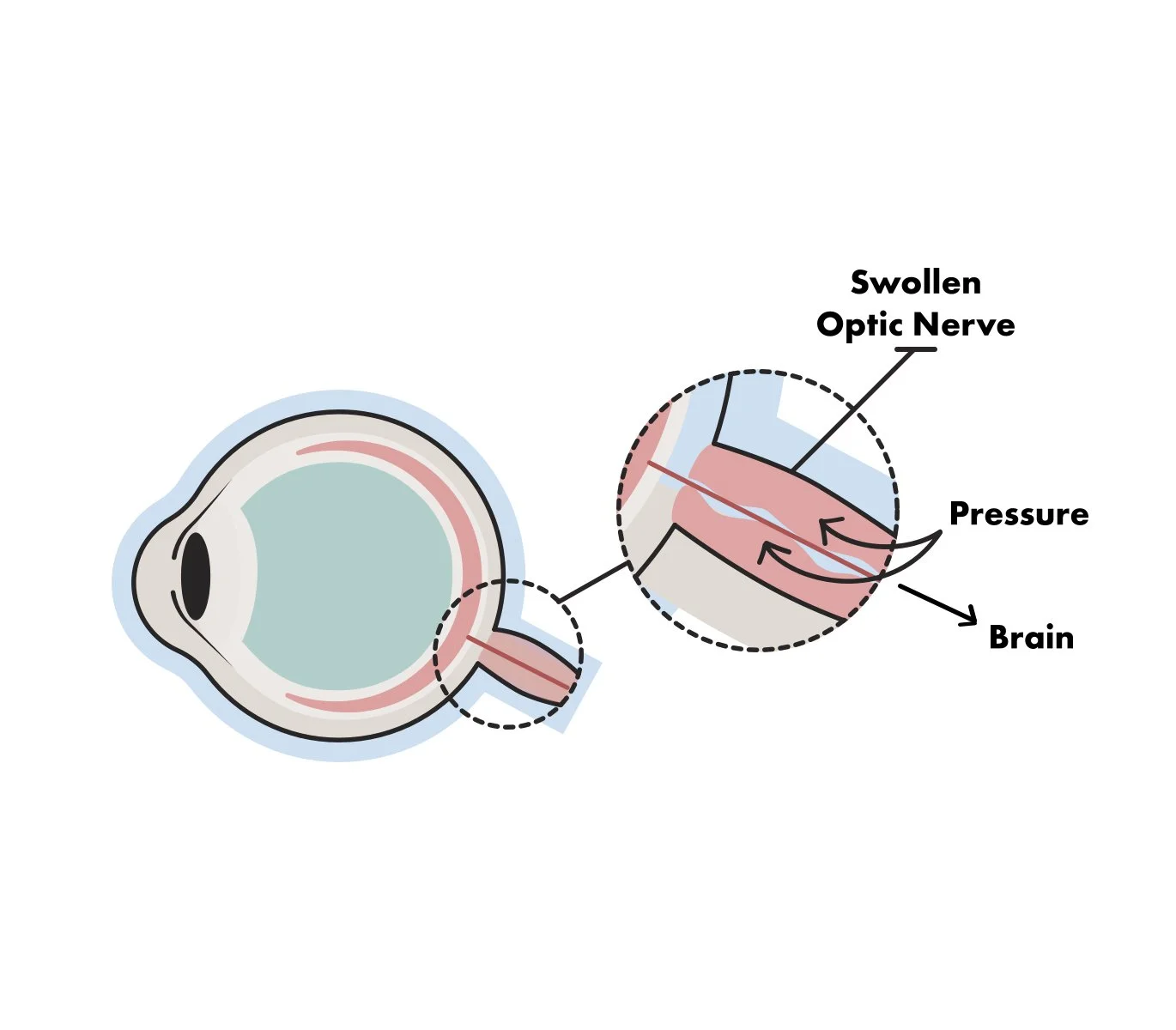Papilledema
Understanding the Causes, Symptoms, and Treatment
Papilledema is a medical condition characterized by swelling of the optic disc, where the optic nerve enters the eye. This swelling is typically caused by increased pressure in the brain, known as intracranial pressure (ICP). Papilledema is considered a serious condition because it can lead to vision loss and may indicate the presence of life-threatening conditions like brain tumors, hemorrhages, or other neurological disorders.
Early diagnosis and treatment can significantly improve outcomes and prevent potential vision loss.
Causes of Papilledema
Papilledema occurs when increased pressure in your skull affects the optic nerve. Common causes of this increased intracranial pressure include:
Idiopathic Intracranial Hypertension (IIH): Also known as pseudotumor cerebri, this condition causes increased brain pressure without a clear reason. It's more common in overweight women of childbearing age. Learn more about IIH here
Brain Tumors or Abscesses: Growths or infections in the brain can block the normal flow of cerebrospinal fluid, leading to increased pressure. [Learn more about Intracranial, Pituitary, and Orbital Tumors here]
Intracranial Hemorrhage: Bleeding in the brain from trauma, stroke, or a ruptured aneurysm can raise pressure inside the skull.
Meningitis or Encephalitis: Infections of the brain or its surrounding tissues cause inflammation and swelling.
Hydrocephalus: A buildup of cerebrospinal fluid in the brain increases pressure.
Cerebral Venous Sinus Thrombosis: A blood clot in the brain's venous sinuses leads to increased pressure.
Severe Hypertension: In rare cases, extremely high blood pressure can cause brain swelling.
Symptoms of Papilledema
The symptoms of papilledema can vary depending on the cause and severity but often include:
Headaches: Often the first sign of increased intracranial pressure. These headaches may worsen when lying down, coughing, or straining.
Vision Changes: Blurred or double vision, temporary episodes of vision loss, or narrowing of your visual field.
Nausea and Vomiting: Due to the increased pressure affecting the brain.
Pulsatile Tinnitus: A rhythmic whooshing or buzzing sound in your ears that matches your heartbeat.
Swollen Optic Disc: Detected during an eye exam; swelling of the optic nerve head is a hallmark sign of papilledema.
Regular comprehensive eye exams are essential for early detection of this condition.
Important: If you experience frequent headaches that worsen when lying down or notice changes in your vision—such as blurriness or double vision—these could be signs of papilledema. Without treatment, papilledema can lead to permanent vision loss as the optic nerve becomes damaged over time.
Conditions Associated with Papilledema
Papilledema is not a disease itself but a symptom of underlying conditions that increase intracranial pressure. Common conditions where papilledema may occur include:
Idiopathic Intracranial Hypertension (IIH): Increased pressure in the brain without an obvious cause, primarily affecting young, overweight women. Find out more about IIH
Brain Tumors and Abscesses: Block the normal flow of cerebrospinal fluid, leading to increased pressure.
Intracranial Hemorrhage: Bleeding from trauma, stroke, or aneurysm increases skull pressure.
Meningitis and Encephalitis: Infections cause inflammation and swelling in the brain.
Hydrocephalus: Abnormal buildup of cerebrospinal fluid results in increased pressure.
Cerebral Venous Sinus Thrombosis: A rare blood clot condition in the brain's venous sinuses.
Severe Hypertension: Extremely high blood pressure can, in rare cases, cause brain swelling.
In all these conditions, timely diagnosis and treatment are critical to managing papilledema and preventing permanent vision loss.
When to Seek Medical Attention
If you're experiencing symptoms like persistent headaches, vision changes, nausea, or hearing a pulsing sound in your ears, it's important to seek medical attention immediately. Early diagnosis and treatment can significantly improve outcomes and help prevent serious complications.
How Papilledema Is Diagnosed
Diagnosing papilledema requires a thorough eye examination and additional tests to identify the underlying cause of increased ICP. The process usually involves:
Comprehensive Eye Exam: Your eye doctor will evaluate your vision and perform a dilated fundus examination to look at the optic nerve.
Optical Coherence Tomography (OCT): This imaging test provides detailed images of the optic nerve to assess the extent of swelling.
Visual Field Testing: This test checks for any loss of peripheral vision, which can occur with papilledema.
Neuroimaging: CT scans or MRI scans of the brain are often needed to identify potential causes like tumors, hemorrhages, or structural abnormalities.
Lumbar Puncture (Spinal Tap): If IIH is suspected, a lumbar puncture may be performed to measure the pressure of the cerebrospinal fluid and rule out infections or other causes.
Treatment for Papilledema
The treatment for papilledema focuses on reducing intracranial pressure and addressing the underlying cause. Depending on the diagnosis, the following treatments may be recommended:
Treating the Underlying Condition: If a brain tumor, hemorrhage, or infection is the cause, immediate medical or surgical intervention may be required.
Medications: For conditions like IIH, medications such as Acetazolamide (Diamox) can help reduce fluid buildup and lower ICP. Diuretics may also be prescribed to decrease pressure.
Weight Management: In cases of IIH, weight loss can significantly reduce symptoms and lower intracranial pressure.
Surgery: In severe cases, surgery may be required to relieve pressure on the brain. Shunt surgery can divert excess cerebrospinal fluid away from the brain, and optic nerve sheath fenestration can relieve pressure on the optic nerve.
Regular Monitoring: Patients with papilledema require close follow-up to monitor for changes in vision and optic nerve health.
Managing Papilledema and Preventing Vision Loss
Early diagnosis and treatment are critical in preventing permanent damage to the optic nerve and vision loss. At Hashemi Eye Care, our neuro-ophthalmologists are experts in diagnosing and managing complex conditions like papilledema. By working closely with neurologists and other specialists, we provide comprehensive care tailored to each patient’s needs.
Learn More About Papilledema
If you or someone you know is experiencing symptoms of papilledema, prompt medical attention is essential. Contact Hashemi Eye Care for an expert evaluation and personalized treatment plan. For more information on conditions affecting the optic nerve, visit our Optic Nerve Disease page.



